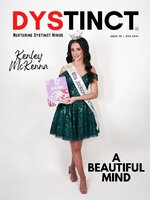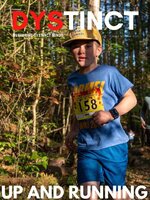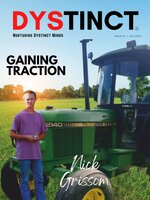Dystinct Magazine is the ultimate resource of inspiration and expertise for families and educators of children with learning difficulties. Dystinct Magazine seeks to find the extra ordinary that lies within the ordinary. Every child with learning difficulties is blessed to be distinctively different. We have set out to identify and nurture these differences to instil a strong sense of achievement in children who are often forgotten about. We also bring to you relevant Up-to-date evodemce based advise from leading experts in the industry to help you navigate the path to success. We have exclusive interviews and content within the magazine, giving you fantastic insights into the world of learning difficulties - dyslexia, dyscalculia, dysgraphia, and dyspraxia. At Dystinct, we care about our children and want to help them find their wings and fly. This is a platform for children with learning difficulties to have their stories told and voices heard.
EDITOR'S NOTE
Dystinct Magazine
DYSTINCT CONTRIBUTORS
FLYNN ELDRIDGE • Dystinct journalist, Flynn Eldridge's interview with Karen Willson of Simply Homeschool.
WHAT’S LANGUAGE GOT TO DO WITH IT? THE IMPACT OF LANGUAGE ON LITERACY • You may have heard that language has an impact on literacy. You also have likely heard of the International Dyslexia Association’s definition of dyslexia (2002) as a “languagebased learning disability”. Perhaps your child has the classification of specific language impairment on their IEP or receives services from a speech and language pathologist. Despite regular reminders of the importance of language on literacy, you may still be left wondering how language is connected to literacy. The purpose of this article is to demystify the construct of language by explaining that literacy is language, just in written form.
DYSTINCT JOURNEY ALYCE PROCTER • 32-year-old Alyce Sophia Procter is an art teacher who operates out of a shipping container converted to a stunning studio in picturesque Emerald in the Dandenong Ranges of Victoria, Australia. Alyce who is dyslexic and neurodivergent has a beautiful way with words, and she hopes to write a book someday soon.
MOTIVATION MOTIVATING STUDENTS WITH DYSLEXIA TO LEARN
UNDERSTAND MOTIVATION
DEVELOP YOUR PERSONAL QUALITIES AS A TEACHER • Pointers to develop your qualities as a teacher
IMPROVE YOUR UNDERSTANDING OF LEARNING • Pointers to increase motivation of your students with dyslexia to learn.
DYSTINCT JOURNEY SKYLAR LAHODA
THREE HOMESCHOOL STRATEGIES THE KEYS TO SUCCESS
LEARN • Learn as much as you can about the challenges your child experiences. If you suspect they have challenges you don't understand, begin some general research. Increase your knowledge. Search out the indicators. Learn about the different types of learning difficulties and start making written observations about your child's challenges and how these come out in practice in daily learning.
CHOOSE THE BEST CURRICULUM/RESOURCES YOU CAN AFFORD • A curriculum is not required for homeschool. You can develop your own curriculum or use natural learning. There are also thousands of free resources available.
FIND YOUR VILLAGE • Seek community and connection with others who walk this road.
A FEW FINAL WORDS
EMPOWERMENT CAMP REPORT
Perceptions about Dyslexia Across Various Cultures

 Sep 01 2024
Sep 01 2024
 Jul 01 2024
Jul 01 2024
 May 01 2024
May 01 2024
 Mar 01 2024
Mar 01 2024
 Jan 01 2024
Jan 01 2024
 Nov 01 2023
Nov 01 2023
 Sep 01 2023
Sep 01 2023
 Jul 01 2023
Jul 01 2023
 May 01 2023
May 01 2023
 Mar 01 2023
Mar 01 2023
 Jan 01 2023
Jan 01 2023
 Nov 01 2022
Nov 01 2022
 Sep 01 2022
Sep 01 2022
 Jul 01 2022
Jul 01 2022
 May 01 2022
May 01 2022
 Mar 01 2022
Mar 01 2022
 Jan 01 2022
Jan 01 2022
 Nov 01 2021
Nov 01 2021
 Sep 01 2021
Sep 01 2021
